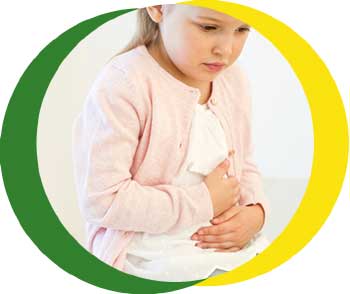Tummy ache

Tummy ache in children is common. Most children do not require treatment and the pain will get better by itself.
- Common causes of tummy ache include constipation, a water works infection (urinary tract infection) and tummy bugs (gastroenteritis)
- Less common causes include appendicitis. Most children with chronic abdominal pain never have a cause found.
When should you worry?
If your child has any of the following:
- Becomes pale and floppy
- Develops cold hands and feet
- Is going blue around the lips
- Becomes drowsy or difficult to wake
- Has green or blood stained vomit
- Develops severe pain despite pain relief such as paracetamol or ibuprofen
- Has testicular pain (especially in teenagers)
You need urgent help
Go to the nearest Hospital Emergency (A&E) Department or phone 999
If your child has any of the following:
- Develops a swollen tummy
- Pain in middle to right hand side of the tummy
- Pain on urination
- Has blood in their poo or wee
- Experiences constant pain for more than 1 day despite pain killers
- Has a fever or symptoms continuing for more than 5 days
- Becomes increasingly thirsty
- Is weeing significantly more or less than normal
- Develops yellow skin or eyes
- Has poor growth
You need to contact a doctor or nurse today
Please ring your GP surgery or call NHS 111 – dial 111
We recognise that during the current COVID-19 crisis, at peak times, access to a health care professional may be delayed. If symptoms persist for 4 hours or more and you have not been able to speak to either a member of staff from your GP practice or to NHS 111 staff, then consider taking them to your nearest Emergency Department
If your child:
- Is alert and interacts with you
- Develops diarrhoea & vomiting but no red or amber signs
- Experiences pain associated with menstruation in a girl
- Is frequently constipated
- If your child has an itchy bottom consider de-worming
- Additional advice is also available to young families for coping with crying of well babies – click here
Self care
Continue providing your child’s care at home. If you are still concerned about your child, call NHS 111 – dial 111
What should you do?
- Offer your child a normal diet and plenty of fluids
- Do not worry if your child is not eating normally, as long as your child is drinking fluids
- Give them pain relief such as paracetamol (calpol) and or ibuprofen as per the instructions on the packaging
- If their pain is not controlled with simple pain relief, if they develop jaundice (yellow skin or eyes), have a swollen tummy, are peeing more or less than usual or have blood in their poo or wee, you should arrange for them to be seen urgently by a medical practitioner. Call your GP surgery or NHS 111
- If your child also has runny poos (diarrhoea), try to avoid them getting dehydrated (see diarrhoea and vomiting information sheet)
How long will your child’s symptoms last?
- The duration of your child’s symptoms will depend on the cause of their abdominal pain
- If they are constipated, their pain may improve once they have had a poo
- If they have gastroenteritis, it may last a few days.
Where should you seek help?
- If it is non-urgent, speak to your local pharmacist or health visitor.
- If your child has any of the above features, urgently see your GP. For an urgent out-of-hours GP appointment, call NHS 111.
- You should only call 999 or go your nearest A&E department in critical or life threatening situations.

